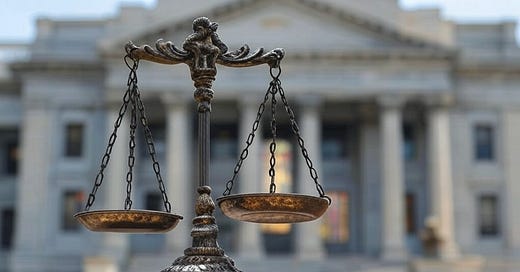Navigating Good and Evil: The Role of Civil Government in Romans 12-13
Part 4: A Biblical Discourse On The Church's Response To Extra-Biblical Commands
In my last article we considered the biblical concepts of good and evil, how God alone gets to define them, and we saw the use of them in Romans 12.
There we saw the command to be transformed by the renewing of our minds so that we’d know God’s good will (v2), that genuine love hates God-defined evil and clings to God-defined good, and that we have a duty to display in both word and deed what God defines as good even in the face of evil being done to us. Specifically, vengeance belongs to God and even when we are recipients of evil we do not get to exercise His wrath on His behalf. When we come to Romans 13 these conclusions become our foundation moving forwards.
At first glance, Romans 13 might seem to be a change of topic, but chapters 12 and 13 form a single unit. The parallels of good and evil continue (13:3, 4), and there is also repetition of the concept of vengeance and wrath (12:19, 13:4).
In our discussion of chapter 12 in the last article we saw that when evil is done to us we are not to respond with evil. More specifically, though justice is required for such evil, it is simply not our sphere – vengeance and the execution of wrath belongs to God (12:19). We might initially think that this is referring to some final judgement after death, but this is where chapter 13 follows on from chapter 12 to explain the outworking of God’s wrathful vengeance.
While the verse 1 does tell us “to be in subjection to the governing authorities”, the very same verse goes on to say that these authorities (in whatever sphere they be in, not only civil government) that exist have been appointed by God. This is crucial. Because God has all authority, there is no legitimate human authority except that which has been appointed by God. They have no inherent authority of their own – all the authority that they have is God’s that He has delegated to them. This is why those who resist that authority have resisted God (v2).
But then verses 3-6 go on to explain the purpose of civil government and thus outlining the authority He has delegated to them. It is in this section that we see the return to the concepts of good and evil, and wrath and vengeance. Moreso, this section will be mind-blowing to the typical Christian who has only ever heard the “soundbite” of the isolated first half a verse without its context and who has never carefully read and considered the remainder of the context.
Let’s note 3 key points in these following verses:
Government is not a separate god to whose every whim we are required to obey. Rather it is a “minister of God” (v4) – his “servant” (v6). God has delegated a job to civil government and given it the authority to do that job.
The God-given job of governments is to praise what is good (v3b) and punish what is evil (v4). Note that the use of “good” and “evil” in chapter 12 has irrevocably linked the definition of these words in alignment with the will of God. He defines what is good and what is evil – not you, not me, and not governments. They are simply to praise and reward good and punish evil as God defines them.
Vengeance and wrath against evil is God’s domain (12:19), but He has delegated the exercise of that role and the accompanying authority to do it to civil government. They serve God as His ministers as they punish what is evil in His world – working as His delegated avengers bringing His “wrath on the one who practices evil” (v4).
The immediate conclusion of this, in harmony with chapter 12, is that we do not get to repay evil with the vengeance and wrath it deserves, God does. Thus we must only repay evil with good, not further evil. But this does not mean justice is absent from this world currently awaiting some final, eternal judgement. God has delegated the role to civil government and its rulers.
We can see the sense in this immediately, I hope. If someone were to harm our loved ones, we would doubtless feel a degree of “righteous anger”. Those who have done evil must be punished, yes, but we in that moment are perhaps the least qualified to determine the appropriate wrathful response. That role is passed onto government.
But the implications of this text go far beyond this immediate and obvious conclusion. It is these further implications that we shall turn to next time.






